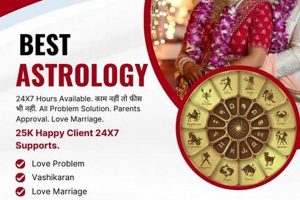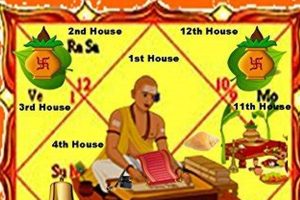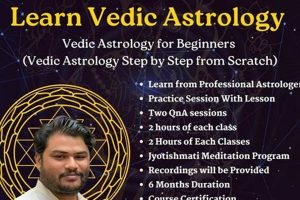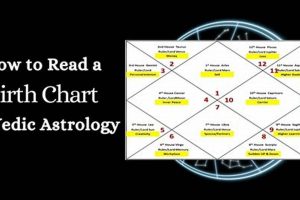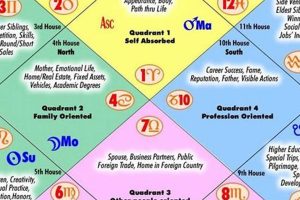Jyotish, the traditional Hindu system of astrology, is often researched online using specific search terms. Individuals seeking insights into their birth charts, planetary transits, or other astrological information frequently utilize online resources and search engines. For example, someone might look for information about the compatibility of their astrological signs with a potential partner or explore upcoming planetary periods that could influence specific life areas.
The availability of digital platforms offering interpretations and calculations based on Vedic principles makes this ancient practice accessible to a global audience. This empowers individuals to engage with Jyotish for self-reflection, personal growth, and gaining a deeper understanding of life events. Historically, astrological knowledge was primarily passed down through lineages and required consultations with expert astrologers. Online resources democratize access to this information, providing individuals with tools for self-discovery and empowering them to explore Jyotish at their own pace.
This accessibility allows for a broader understanding of concepts such as nakshatras (lunar mansions), dashas (planetary periods), and yogas (planetary combinations), expanding the reach and relevance of this traditional system in contemporary life. Further exploration will delve into specific areas within Vedic astrology, offering detailed insights into its rich tapestry of concepts and applications.
Tips for Exploring Vedic Astrology
Effective engagement with Jyotish requires a thoughtful approach. These tips provide guidance for navigating the complexities of this ancient system.
Tip 1: Understand the Birth Chart as a Blueprint. The birth chart, a snapshot of the celestial positions at the time of birth, is not a prediction of destiny, but a map of potentials and tendencies.
Tip 2: Focus on Self-Awareness, Not Prediction. While predictive elements exist, Jyotish is best utilized for understanding inherent strengths, weaknesses, and karmic patterns. This encourages self-improvement and informed decision-making.
Tip 3: Seek Qualified Guidance When Needed. Online resources provide valuable information, but complex situations often benefit from consultations with experienced practitioners.
Tip 4: Learn the Fundamentals of Planetary Influences. Each planet embodies specific energies and influences different life areas. Grasping these fundamentals empowers individuals to interpret their charts more effectively.
Tip 5: Explore the Significance of Nakshatras. These lunar mansions add a nuanced layer of understanding to planetary placements, revealing subtle influences and karmic predispositions.
Tip 6: Integrate Astrological Insights Gradually. Implementing changes based on astrological insights requires patience and self-reflection. Gradual integration allows for a deeper understanding of how these principles apply to individual circumstances.
Tip 7: View Transits as Opportunities for Growth. Planetary transits are not merely events to be endured, but opportunities for learning and evolving. Understanding their influence can facilitate personal transformation.
By embracing these tips, individuals can harness the wisdom of Jyotish for self-discovery, personal growth, and navigating life’s complexities with greater awareness.
Ultimately, Vedic astrology serves as a tool for self-understanding, not a determinant of fate. Further exploration can lead to deeper insights into the interplay of planetary influences and individual karma.
1. Jyotish
Jyotish, often referred to as Vedic astrology, forms the basis of online searches related to “vedic astrology astro seek.” Understanding this ancient system is crucial for interpreting the information found through online resources. Jyotish provides the framework and underlying principles for calculating birth charts, predicting planetary transits, and understanding astrological compatibility.
- Birth Chart Analysis
Jyotish utilizes the birth chart as a primary tool for analysis. This diagram depicts the celestial positions at the time of birth, providing a unique astrological blueprint. Online searches often revolve around understanding specific placements within the birth chart, such as the ascendant, Sun sign, and Moon sign. These placements offer insights into personality, strengths, weaknesses, and karmic tendencies. For example, someone might search for the meaning of having Mars in the seventh house, seeking to understand its implications for relationships.
- Planetary Transits and Predictions
Jyotish places significant emphasis on planetary transits, which describe the movement of planets through the zodiac. Online platforms often provide information about current and upcoming transits, offering interpretations of their potential impact. Individuals might search for the effects of Saturn’s transit through a specific sign, seeking guidance on how to navigate potential challenges or capitalize on opportunities. Understanding these transits within the framework of Jyotish provides context and deeper meaning.
- Astrological Compatibility (Synastry)
Jyotish also addresses relationship compatibility through the study of synastry, which compares the birth charts of two individuals. Online tools often allow users to input birth details and receive compatibility reports. These reports analyze planetary interactions between charts, offering insights into potential strengths and weaknesses within a relationship dynamic. Jyotish provides the underlying principles for understanding these interactions, helping individuals navigate interpersonal dynamics with greater awareness.
- Remedial Measures (Upayas)
Jyotish often incorporates remedial measures known as upayas, which are suggested practices to mitigate negative planetary influences or enhance positive ones. Online resources may provide information about specific upayas related to planetary placements or transits. These can include gemstone recommendations, mantra recitations, or specific rituals. Understanding the rationale behind these upayas within the context of Jyotish is crucial for discerning their appropriate application.
By understanding these core facets of Jyotish, individuals engaging in online searches related to Vedic astrology can better interpret the information they encounter. This knowledge empowers them to utilize online resources effectively and gain a deeper understanding of their astrological blueprint, planetary influences, and potential life paths. Ultimately, Jyotish serves as a framework for navigating life’s complexities with greater awareness and self-understanding.
2. Birth Charts
Birth charts serve as the foundational element within Vedic astrology, acting as a personalized cosmic map depicting the planetary positions at the precise moment of an individual’s birth. The practice of “vedic astrology astro seek” often begins with generating or analyzing a birth chart. This chart, calculated based on specific birth details (date, time, and location), becomes the basis for astrological interpretations and predictions. The positions of celestial bodies within the chart, including the sun, moon, and planets, in various signs and houses, are believed to influence personality traits, life path, and potential experiences. For example, the position of the Moon in a specific sign and house might offer insights into emotional tendencies and the type of relationships an individual is likely to attract. Similarly, the placement of Jupiter could indicate areas of potential growth and abundance.
The relationship between birth charts and online searches related to Vedic astrology is a causal one. Individuals seeking astrological information online often do so to gain deeper understanding of their birth charts. The availability of digital platforms and software allows for easy generation and analysis of birth charts, democratizing access to this ancient practice. Someone born under the sign of Taurus, for example, might search for information regarding the influence of Venus, the ruling planet of Taurus, on their chart. Or, an individual experiencing a challenging period might seek information about current planetary transits impacting specific houses in their birth chart. This search for understanding drives the pursuit of astrological knowledge online.
Understanding the significance of birth charts is essential for effective engagement with Vedic astrology. The birth chart serves not as a deterministic prediction of fate, but rather as a complex map of potentials and tendencies. By understanding the interplay of planetary influences within their birth chart, individuals can gain valuable self-awareness and make informed decisions. While online resources can offer valuable insights, consulting with experienced Vedic astrologers provides personalized guidance and deeper understanding of the nuances within a birth chart. This combination of online resources and expert consultation empowers individuals to utilize the wisdom of Vedic astrology for self-discovery, personal growth, and navigating life’s complexities with greater awareness.
3. Online Resources
The rise of digital platforms has profoundly impacted the accessibility and practice of Vedic astrology. “Vedic astrology astro seek” reflects the growing reliance on online resources for exploring this ancient system. These resources provide a readily available gateway to information, tools, and community, enabling individuals to engage with Jyotish in ways previously unavailable. This shift has democratized access to astrological knowledge, allowing a wider audience to explore birth charts, planetary transits, and other astrological concepts.
- Astrology Software and Calculators
Numerous websites and software applications offer tools for generating birth charts, calculating planetary positions, and predicting transits. These resources automate complex calculations, providing readily accessible data for astrological interpretation. For example, an individual can input their birth details into an online calculator to instantly generate their birth chart, eliminating the need for manual calculations. This facilitates quicker access to astrological information and allows users to focus on interpretation and application.
- Informational Websites and Blogs
A vast repository of information on Vedic astrology exists online, ranging from introductory articles to in-depth analyses of specific astrological concepts. These resources cater to various levels of understanding, enabling individuals to learn at their own pace. For example, someone new to Jyotish might explore a blog post explaining the significance of the nakshatras, while a more experienced practitioner might delve into an article discussing advanced techniques for predicting planetary periods (dashas). This wealth of online information supports self-directed learning and facilitates deeper understanding.
- Online Communities and Forums
The internet fosters connections between individuals interested in Vedic astrology, creating virtual communities and forums for discussion and knowledge sharing. These platforms enable individuals to connect with others who share similar interests, ask questions, and exchange insights. For instance, someone seeking clarification on a specific astrological concept can post a question in a forum and receive responses from experienced practitioners or fellow learners. This fosters a sense of community and provides valuable peer-to-peer learning opportunities.
- Consultations with Astrologers
Online platforms facilitate access to professional astrologers, offering virtual consultations and personalized readings. This eliminates geographical limitations and expands access to expert guidance. An individual seeking personalized insights into their birth chart or guidance on navigating a specific life challenge can connect with an astrologer online for a consultation. This integration of technology enhances the accessibility and reach of professional astrological services.
The availability and diversity of online resources have significantly shaped the landscape of “vedic astrology astro seek.” These resources empower individuals to actively engage with Jyotish, fostering self-discovery and deeper understanding of this ancient system. However, critical evaluation and discernment remain essential, especially given the varied quality and credibility of online information. Combining online resources with guidance from experienced practitioners allows for a balanced and informed approach to exploring Vedic astrology.
4. Planetary Transits
Planetary transits constitute a significant area of inquiry within Vedic astrology, directly influencing online searches related to “vedic astrology astro seek.” These transits, representing the continuous movement of planets through the zodiac, are believed to exert dynamic influences on individual lives, prompting many to seek astrological insights online. Understanding planetary transits provides a framework for interpreting current life experiences and anticipating potential future trends within a Vedic astrological context.
- Predictive Astrology
Transits form the basis of predictive astrology in Jyotish. By analyzing the movement of planets in relation to an individual’s birth chart, astrologers can offer insights into potential life events and experiences. For example, the transit of Saturn through the seventh house might indicate challenges in relationships, while Jupiter’s transit through the tenth house could suggest career advancements. Online searches often focus on understanding the implications of specific planetary transits, reflecting a desire to anticipate and navigate life’s unfolding events.
- Timing of Events
Planetary transits provide a framework for understanding the timing of events within a Vedic astrological context. Specific transits are associated with particular themes or influences, offering potential explanations for the timing of significant life occurrences. For instance, the transit of Rahu (North Node of the Moon) over the natal Moon might coincide with periods of heightened emotional intensity or karmic experiences. Individuals often utilize online resources to research the timing of planetary transits and their potential correlation with life events.
- Personal Growth and Transformation
Planetary transits are not viewed solely as predictive indicators but also as opportunities for personal growth and transformation. Challenging transits, while potentially difficult, can stimulate self-reflection and facilitate inner growth. For example, the transit of Saturn through the first house, often associated with introspection and self-assessment, can prompt individuals to confront their limitations and develop greater self-awareness. Online searches related to challenging transits often reflect a desire to understand their purpose and navigate them constructively.
- Remedial Measures (Upayas)
Within Vedic astrology, specific practices, or upayas, are often recommended to mitigate the negative effects of challenging planetary transits or enhance the positive influences of beneficial ones. These upayas can range from mantra recitations and gemstone recommendations to specific rituals. Online searches related to planetary transits frequently include inquiries about relevant upayas, reflecting a proactive approach to navigating planetary influences. This highlights the integration of practical solutions with astrological insights within online searches related to Vedic astrology.
The prevalence of “vedic astrology astro seek” queries relating to planetary transits underscores their central role in understanding the dynamic interplay of cosmic influences within individual lives. By exploring transits through online resources, individuals gain insights into potential life events, the timing of significant occurrences, and opportunities for personal growth. The integration of practical remedies further emphasizes the proactive nature of online searches related to Vedic astrology, reflecting a desire not merely to understand but also to navigate life’s complexities with greater awareness and agency.
5. Astrological Compatibility
Astrological compatibility, often referred to as synastry, plays a prominent role in online searches related to “vedic astrology astro seek.” This facet of Jyotish examines the interplay of planetary energies between two individuals’ birth charts, aiming to assess potential harmony or conflict within a relationship. The cause-and-effect relationship between astrological compatibility and online searches stems from a fundamental human desire to understand and navigate interpersonal dynamics. Individuals often seek astrological insights online to gain clarity on relationship potentials, challenges, and growth areas. For example, someone considering a romantic partnership might research the compatibility between their Moon sign and their potential partner’s Sun sign, seeking insights into emotional compatibility and shared values. Or, individuals experiencing conflict in an existing relationship might explore astrological aspects between their charts to understand the root causes of tension. This search for understanding drives the integration of astrological compatibility within online searches related to Vedic astrology.
The practical significance of understanding astrological compatibility lies in its potential to foster greater self-awareness and enhance relationship dynamics. While astrological compatibility does not determine the success or failure of a relationship, it offers valuable insights into potential strengths and weaknesses within the interpersonal dynamic. By understanding the astrological interplay between two charts, individuals can gain awareness of potential areas of harmony, as well as potential challenges that might arise. For instance, recognizing a challenging aspect between Mars in one chart and Venus in another might highlight potential conflicts related to passion and affection. This awareness allows individuals to approach these sensitive areas with greater understanding and develop strategies for navigating them constructively. Synastry can illuminate karmic connections, communication styles, and areas of shared values, offering a nuanced perspective on relationship dynamics.
Astrological compatibility within the context of “vedic astrology astro seek” serves as a valuable tool for self-reflection and relationship analysis. It empowers individuals to gain a deeper understanding of interpersonal dynamics, navigate challenges with greater awareness, and foster more harmonious connections. However, it’s crucial to recognize that astrological compatibility offers insights, not definitive predictions. Relationships are complex and influenced by various factors beyond astrological considerations. Combining astrological insights with open communication, mutual respect, and a willingness to work through challenges remains essential for building healthy and fulfilling relationships. The pursuit of astrological compatibility online reflects a desire to understand relationships with greater depth and utilize this ancient wisdom for personal growth and enhanced interpersonal connections.
6. Self-Discovery
Self-discovery forms a central theme within the pursuit of Vedic astrology, deeply intertwined with online searches related to “vedic astrology astro seek.” The causal relationship between these concepts stems from the inherent human desire to understand oneself more profoundly. Vedic astrology offers a framework for exploring personality traits, karmic patterns, and life purpose, prompting individuals to seek astrological insights online as a means of self-exploration. This search for self-understanding drives the integration of self-discovery within online searches related to Jyotish. For example, an individual questioning their career path might explore the tenth house in their birth chart and the influence of its ruling planet, seeking astrological guidance for career choices aligned with their inherent strengths. Or, someone grappling with recurring relationship challenges might analyze the planetary placements in their seventh house, hoping to gain insights into their relationship patterns and karmic predispositions. This pursuit of self-knowledge through astrological exploration fuels the prevalence of “vedic astrology astro seek” searches.
The importance of self-discovery as a component of “vedic astrology astro seek” lies in its potential to empower individuals to make more informed life choices. Vedic astrology does not dictate destiny, but rather provides a map of potentials and tendencies. By understanding their astrological blueprint, individuals can gain clarity on their strengths, weaknesses, and karmic influences, enabling them to make choices aligned with their true nature. For instance, someone discovering a strong influence of Saturn in their chart might recognize a predisposition towards discipline and hard work, leading them to pursue career paths requiring these qualities. Or, an individual identifying a prominent Jupiter influence might embrace opportunities for expansion and higher learning. This integration of self-discovery with astrological insights empowers individuals to navigate life with greater awareness and purpose. Practical applications of this understanding might involve seeking guidance from experienced astrologers, participating in workshops or online courses, or engaging in self-reflection based on astrological interpretations. These practices facilitate deeper exploration of self and the integration of astrological knowledge into daily life.
In essence, the connection between self-discovery and “vedic astrology astro seek” represents a journey of self-exploration facilitated by online resources and astrological insights. Challenges might include discerning credible sources of information online and avoiding deterministic interpretations of astrological principles. However, the underlying pursuit of self-knowledge through Vedic astrology remains a powerful motivator for those seeking to understand themselves more deeply and live a more purposeful life. The integration of self-discovery with online exploration of Vedic astrology empowers individuals to take ownership of their lives, navigate challenges with greater awareness, and make choices aligned with their true nature and potential.
Frequently Asked Questions about Vedic Astrology
This section addresses common inquiries regarding Vedic astrology, aiming to provide clear and concise information.
Question 1: How does Vedic astrology differ from Western astrology?
Vedic astrology utilizes a sidereal zodiac based on the fixed constellations, while Western astrology employs a tropical zodiac based on the equinoxes. This fundamental difference results in variations in planetary placements and interpretations between the two systems. Vedic astrology also places greater emphasis on lunar mansions (nakshatras) and planetary periods (dashas), offering nuanced insights into karmic influences and life cycles.
Question 2: Is Vedic astrology fatalistic?
Vedic astrology does not promote fatalism. While planetary influences are recognized, free will and individual actions play a crucial role in shaping life experiences. Vedic astrology provides a map of potentials and tendencies, not a predetermined script. It empowers individuals to understand their inherent strengths and weaknesses, enabling informed decision-making and proactive navigation of life’s challenges.
Question 3: What is the significance of a birth chart in Vedic astrology?
The birth chart, or janma kundali, serves as a unique astrological blueprint. It represents the positions of celestial bodies at the precise moment of birth, offering insights into personality, karmic patterns, and life path. Analyzing the birth chart provides a framework for understanding individual strengths, weaknesses, and potential life experiences. It serves as a valuable tool for self-discovery and personal growth.
Question 4: How can one find a reputable Vedic astrologer?
Seeking recommendations from trusted sources, researching an astrologer’s credentials and experience, and scheduling an initial consultation to assess compatibility are crucial steps in finding a reputable Vedic astrologer. Evaluating the astrologer’s approach, communication style, and ethical practices ensures a beneficial and insightful experience.
Question 5: What are some common misconceptions about Vedic astrology?
Common misconceptions include the belief that Vedic astrology is solely predictive, fatalistic, or incompatible with other belief systems. Vedic astrology is a complex system encompassing self-discovery, personal growth, and understanding karmic influences. It complements, rather than contradicts, individual beliefs and empowers informed decision-making.
Question 6: How can online resources be utilized effectively for learning about Vedic astrology?
Online resources offer valuable introductory information, tools for generating birth charts, and access to a global community of practitioners. However, critical evaluation of online information is crucial. Combining online resources with guidance from experienced astrologers ensures a balanced and well-informed approach to learning.
Understanding the core principles and dispelling common misconceptions surrounding Vedic astrology empowers informed exploration and application of this ancient system for self-discovery and personal growth.
Further exploration of specific areas within Vedic astrology can provide deeper insights into its rich tapestry of concepts and applications.
Conclusion
Exploration of Vedic astrology through online searches reflects a growing interest in utilizing this ancient system for self-discovery and understanding life’s complexities. Access to digital resources has democratized access to astrological information, empowering individuals to explore birth charts, planetary transits, and astrological compatibility. Understanding the core principles of Jyotish, including the significance of planetary placements, nakshatras, and dashas, provides a framework for interpreting astrological data effectively. While online resources offer valuable tools and information, combining them with guidance from experienced practitioners ensures a balanced and nuanced approach.
Vedic astrology, when approached thoughtfully, offers a powerful lens for self-reflection and personal growth. It empowers individuals to gain deeper insights into their inherent strengths, weaknesses, and karmic patterns. By integrating astrological knowledge with informed decision-making, individuals can navigate life’s challenges with greater awareness and purpose. Continued exploration and thoughtful application of Vedic astrological principles can contribute to a richer understanding of oneself and the interconnectedness of life’s experiences.



